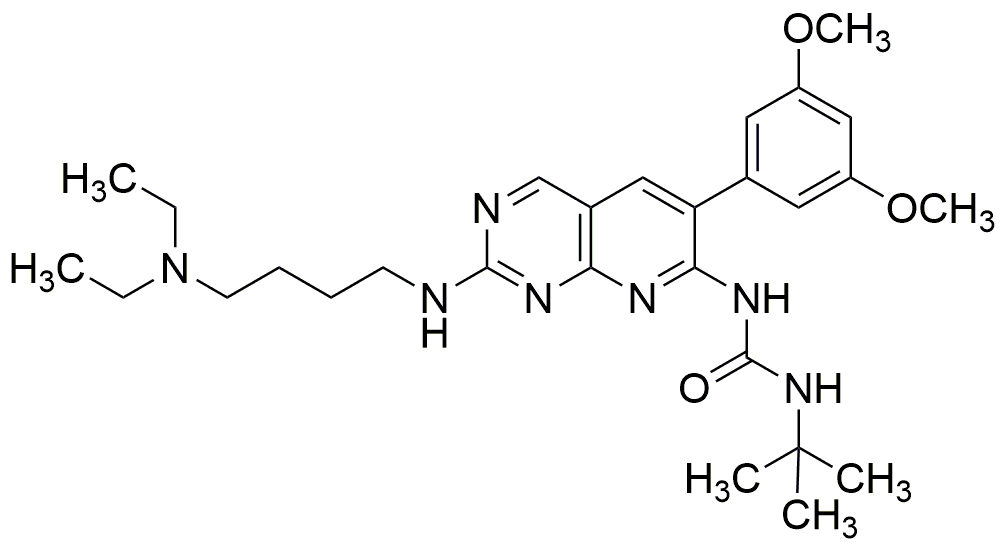PD 173074 is widely utilized in research focused on:
- Oncology Research: This compound is primarily used in cancer research due to its ability to inhibit specific kinases involved in tumor growth, providing a pathway for developing targeted therapies.
- Neuroscience Studies: Researchers leverage PD 173074 to investigate its effects on neurodegenerative diseases, exploring its potential to modulate pathways that protect neuronal health.
- Pharmaceutical Development: The compound serves as a valuable lead in the synthesis of new drugs, particularly in the development of treatments for various cancers and neurological disorders.
- Biochemical Assays: PD 173074 is employed in assays to study cellular signaling pathways, helping scientists understand the mechanisms of disease at a molecular level.
- Comparative Studies: Its unique properties make it a critical reference compound in studies comparing the efficacy of other kinase inhibitors, aiding in the advancement of targeted therapies.
General Information
Properties
Safety and Regulations
Applications
PD 173074 is widely utilized in research focused on:
- Oncology Research: This compound is primarily used in cancer research due to its ability to inhibit specific kinases involved in tumor growth, providing a pathway for developing targeted therapies.
- Neuroscience Studies: Researchers leverage PD 173074 to investigate its effects on neurodegenerative diseases, exploring its potential to modulate pathways that protect neuronal health.
- Pharmaceutical Development: The compound serves as a valuable lead in the synthesis of new drugs, particularly in the development of treatments for various cancers and neurological disorders.
- Biochemical Assays: PD 173074 is employed in assays to study cellular signaling pathways, helping scientists understand the mechanisms of disease at a molecular level.
- Comparative Studies: Its unique properties make it a critical reference compound in studies comparing the efficacy of other kinase inhibitors, aiding in the advancement of targeted therapies.
Documents
Safety Data Sheets (SDS)
The SDS provides comprehensive safety information on handling, storage, and disposal of the product.
Product Specification (PS)
The PS provides a comprehensive breakdown of the product’s properties, including chemical composition, physical state, purity, and storage requirements. It also details acceptable quality ranges and the product's intended applications.
Certificates of Analysis (COA)
Search for Certificates of Analysis (COA) by entering the products Lot Number. Lot and Batch Numbers can be found on a product’s label following the words ‘Lot’ or ‘Batch’.
Numéro de catalogue
Numéro de lot/série
Certificates Of Origin (COO)
This COO confirms the country where the product was manufactured, and also details the materials and components used in it and whether it is derived from natural, synthetic, or other specific sources. This certificate may be required for customs, trade, and regulatory compliance.
Numéro de catalogue
Numéro de lot/série
Safety Data Sheets (SDS)
The SDS provides comprehensive safety information on handling, storage, and disposal of the product.
DownloadProduct Specification (PS)
The PS provides a comprehensive breakdown of the product’s properties, including chemical composition, physical state, purity, and storage requirements. It also details acceptable quality ranges and the product's intended applications.
DownloadCertificates of Analysis (COA)
Search for Certificates of Analysis (COA) by entering the products Lot Number. Lot and Batch Numbers can be found on a product’s label following the words ‘Lot’ or ‘Batch’.
Numéro de catalogue
Numéro de lot/série
Certificates Of Origin (COO)
This COO confirms the country where the product was manufactured, and also details the materials and components used in it and whether it is derived from natural, synthetic, or other specific sources. This certificate may be required for customs, trade, and regulatory compliance.


